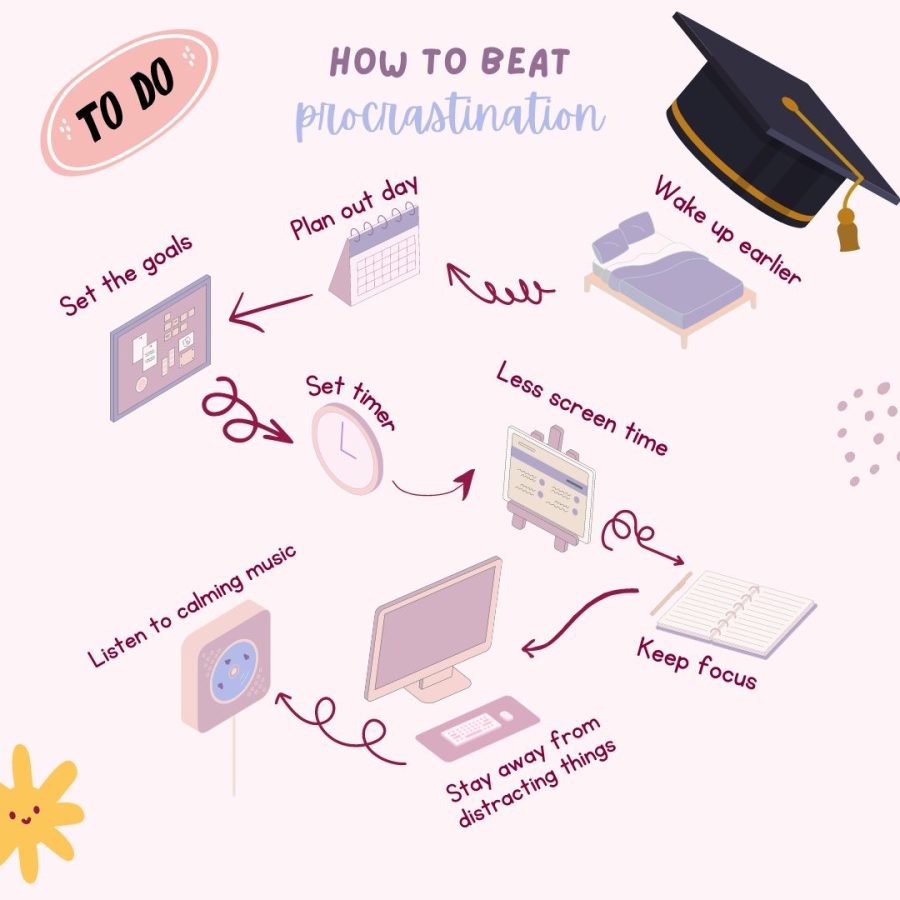Students battle against procrastination
High school procrastination can develop while students are in school and may stick with them until they become adults. Procrastinating may affect a student’s grades, or, more importantly, their overall health. It has been found to lead to severe depression or serious anxiety and stress issues.
Students feeling that a task is not important or relevant to them is the primary reason for procrastination. Not comprehending the material is another critical reason why students procrastinate. No matter the reason, a staggering number of negative effects come with procrastinating. Procrastination is not only counterproductive for students, but also to the teachers. Teachers assign projects and decide how much time they will allow for it to be done, hoping that the students will apportion their time correctly, so that they will not have to worry about doing last-minute work. When students procrastinate, it discourages teachers from offering that much time for future assignments. Senior students at Grayslake North weighed in on how procrastination really feels.
“Next time you feel that your whole body is screaming, ‘I don’t want to, I don’t feel like it,’ ask yourself: what’s the next event that I had planned? What happens then is that you’re moving your attention off your emotions and on to your action,” said senior Logan Perry.
Unfortunately, the effects of procrastination in school aren’t just limited to a student’s academic performance. When procrastination causes a student to receive poor grades or fail a course, he or she may become self-critical, demotivated, and disengaged. This can set the stage for poorer academic performance in the future, creating a vicious cycle from which it can seem difficult or impossible to escape. And it isn’t only future academic performance that may suffer: long after graduation day, job performance can also be negatively impacted. If procrastination has become an ingrained habit by the time the student enters the workforce, he or she is likely to bring the same time management struggles into the workplace. Senior Ryan Page shared his thoughts on what he has experienced in his four years at North.
“Personally as a senior, I do not care as much for school as I did last semester. I want to enjoy my last year at North and make it memorable. Some things I learned are that it is ultimately up to the teacher’s behavior toward the class to see if you can procrastinate or not,” said senior Ryan Page.
Another popular tip is to prioritize your tasks based on urgency and importance. This can be achieved using the Eisenhower Matrix. It helps you to identify the most immediate tasks while leaving the rest for later or not doing them at all. Or try the 1-2-3 Method: If you find yourself procrastinating, count to three and start doing what you have to do. This way, your brain is conditioned to eliminate procrastination every time you do this count. Also consider the 1 Minute Method: If you are procrastinating on a task, force yourself to work on it just for a minute. Usually, this acts as the start that one needs and makes finishing the work way easier.
“Procrastinating has somewhat made me forget about certain events that I had planned. It has ultimately led me to missing practic
es or hanging with my girlfriend. For my homework, I usually get it done in class, but the days that lead to the weekend are days that make me forget to do it because I have plans. My advice for procrastinators such as myself is to go at your own pace, but do not fall behind to the point where you can’t get yourself out of it,” said senior Matthew Nixon.





